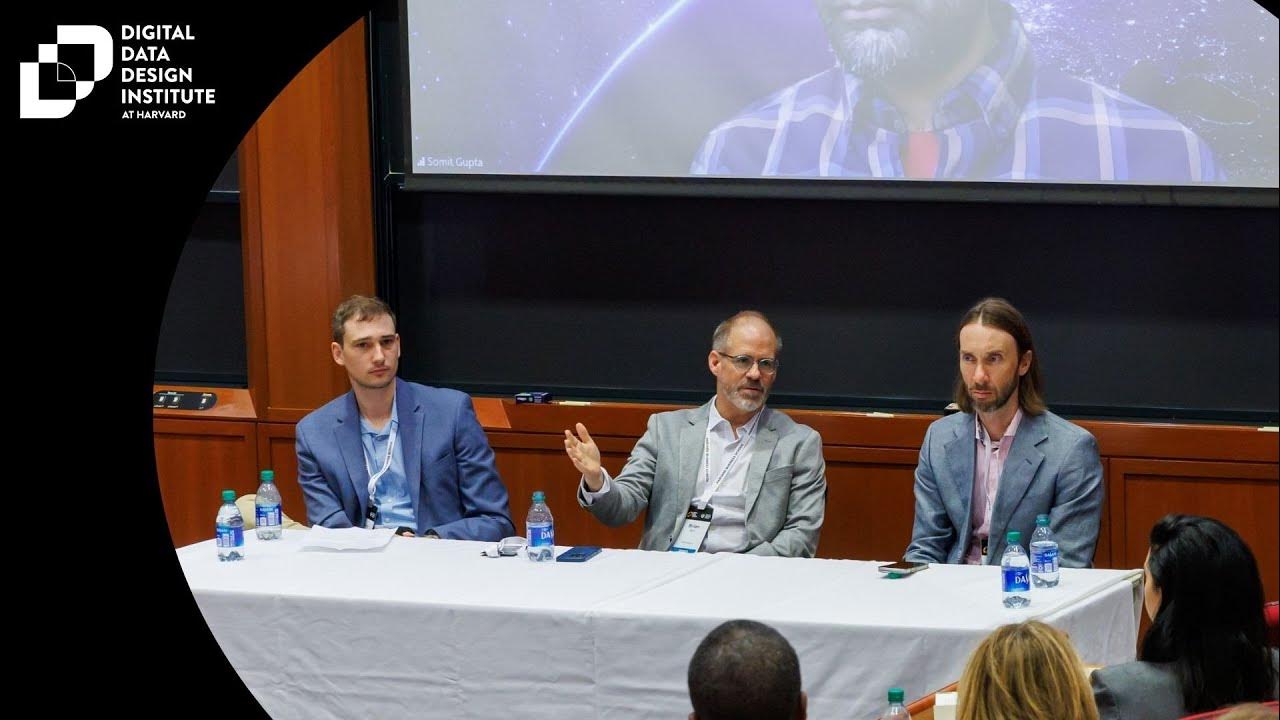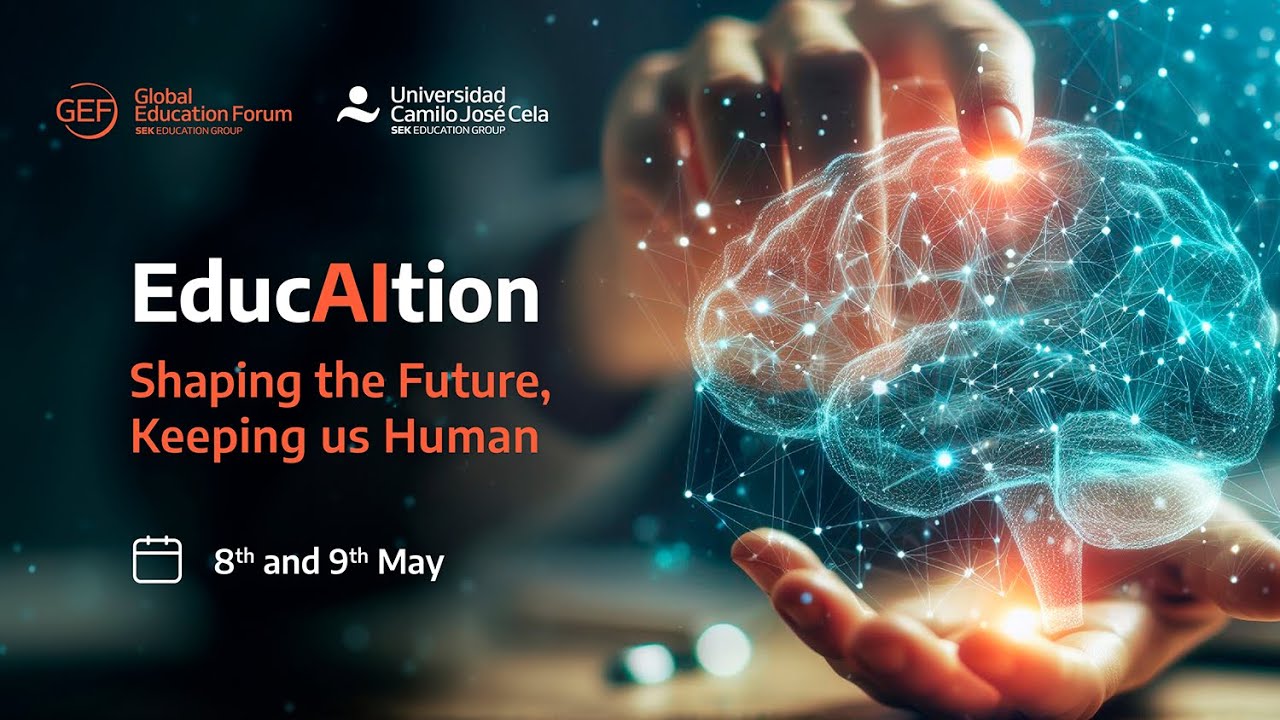GEF Madrid 2024: AI and Critical Thinking
Summary
TLDRThe panel discussion explores the intersection of AI and critical thinking, with a focus on ethical dilemmas and decision-making. Professor Richard Light initiates the conversation with a thought experiment about kidney transplants, highlighting the complexity of ethical judgments. Panelists from diverse educational backgrounds emphasize the importance of teaching discernment and critical analysis in the age of AI, discussing the potential of AI as both an educational tool and a challenge to traditional learning methods.
Takeaways
- 📚 The panel discussion revolves around the intersection of AI and critical thinking, with a focus on how AI can augment or challenge human decision-making and ethical considerations.
- 💡 Professor Richard Light introduces the topic by emphasizing the need for a clear definition of critical thinking and its importance in making decisions, particularly in complex ethical dilemmas like the kidney transplant scenario.
- 🔍 The conversation explores the potential of AI to provide arguments and counterarguments, highlighting the machine's capability to process information quickly but also the importance of human discernment in evaluating these arguments.
- 🌐 Patrick Girma from Ghana discusses the challenges of integrating AI into an educational system traditionally based on rote learning, stressing the need to foster critical thinking from an early age to navigate the information provided by AI.
- 🌟 Ben Nelson emphasizes that critical thinking is not a singular concept but a collection of skills, including decision-making, evaluating claims, and understanding implications, which are crucial in the age of AI.
- 🤖 Dan Levy points out the dual nature of AI as both an assistant in critical thinking and a potential tool for students to bypass actual thinking, underscoring the importance of how AI is used in education.
- 🏛 Mark Kaban discusses the role of AI in education transformation, suggesting that it can enable new teaching methodologies focused on the learning process rather than just the outcome, fostering durable skills like critical thinking.
- 🌱 Jeppe Ugelvig expresses optimism about the future of AI in education, envisioning a blend of human judgment and AI-enabled analysis in decision-making and a transformation in how critical thinking skills are taught.
- 🔑 The panelists agree that the value of critical thinking is heightened in the context of AI, as it becomes more important to teach frameworks for thinking, such as cost-benefit analysis and the Golden Rule, to guide the use of technology ethically and effectively.
- 🌱 There is a call to action for educators to guide students in learning how to think about the world critically, using AI as a tool to gather diverse viewpoints and information, while maintaining human-centric values and ethical considerations.
- 🌟 The discussion concludes with a consensus on the inevitability of AI's role in enhancing critical thinking, with a focus on the importance of human intent and ethical frameworks in shaping how technology is used for the betterment of society.
Q & A
What is the significance of Emily's presence and recording in the session?
-Emily's presence is significant as she is recording the session to provide an output in a few weeks, which is expected to offer valuable insights or analysis based on the discussion, adding an additional layer of reflection and commentary on the topics covered.
What is Patrick's role at the university he founded in Ghana?
-Patrick is in charge of the university he founded in Ghana, implying that he holds a leadership or administrative position, likely overseeing the institution's operations and academic direction.
How does Professor Richard Light define critical thinking?
-Professor Richard Light defines critical thinking as the process needed when making decisions, whether personal or societal policy decisions, and emphasizes the importance of having enough information to make a thoughtful and constructive choice.
What is the ethical dilemma presented by Professor Richard Light involving kidney transplants?
-The ethical dilemma involves a scenario where Professor Light, in need of a kidney transplant, offers to pay $100,000 to a healthy individual willing to donate a kidney. The dilemma raises questions about the ethics of paying for organs and the potential inequities it creates.
What was the outcome of the vote among Harvard graduate students regarding the kidney transplant ethical dilemma?
-60% of the Harvard graduate students voted that the agreement between Professor Light and the kidney donor was good and ethical, as both parties benefited and consented voluntarily. The remaining 40% agreed with the medical ethicist's view that the transaction was inequitable.
How does Ben define critical thinking and its components?
-Ben describes critical thinking as not a single entity but a collection of disparate elements, including decision-making, trade-offs, evaluating claims, and understanding when and how to apply various analytical methods such as cost-benefit analysis.
What is the potential role of AI in fostering critical thinking skills according to Dan Levy?
-Dan Levy suggests that AI can be a powerful tool in fostering critical thinking skills by providing arguments and counterarguments, thus assisting in the analytical process. However, he also acknowledges the potential negative impact if AI is used to do work for students without engaging their critical thinking.
What does Mark Kaban suggest about the role of AI in the process of teaching and learning?
-Mark Kaban suggests that AI can be used as a tool in teaching and learning to develop durable skills that sum up to critical thinking. He emphasizes the importance of using AI to enhance the learning process, focusing on how learning unfolds and the moments of engagement in the process.
How does the panel discuss the potential of AI in the context of different educational systems?
-The panel discusses the potential of AI in various contexts, such as Patrick's mention of the need to move away from rote learning in Ghana and towards critical thinking, and Ben's point about the importance of discernment in an age of AI, where compelling arguments can be quickly generated by AI.
What is the panel's consensus on the relationship between AI and critical thinking?
-The panel consensus is that AI is a tool that can be used to enhance or detract from critical thinking, depending on how it is utilized. There is a call for responsible integration of AI in education to foster critical thinking skills and for students to engage with AI as a tool for analysis and decision-making.
Outlines

Этот раздел доступен только подписчикам платных тарифов. Пожалуйста, перейдите на платный тариф для доступа.
Перейти на платный тарифMindmap

Этот раздел доступен только подписчикам платных тарифов. Пожалуйста, перейдите на платный тариф для доступа.
Перейти на платный тарифKeywords

Этот раздел доступен только подписчикам платных тарифов. Пожалуйста, перейдите на платный тариф для доступа.
Перейти на платный тарифHighlights

Этот раздел доступен только подписчикам платных тарифов. Пожалуйста, перейдите на платный тариф для доступа.
Перейти на платный тарифTranscripts

Этот раздел доступен только подписчикам платных тарифов. Пожалуйста, перейдите на платный тариф для доступа.
Перейти на платный тариф5.0 / 5 (0 votes)






